Stealing The Spotlight
Garrett's Buzzer-Beater Lifts Alvark, Overshadows Featured Clash Of Ex-NBA Big Men
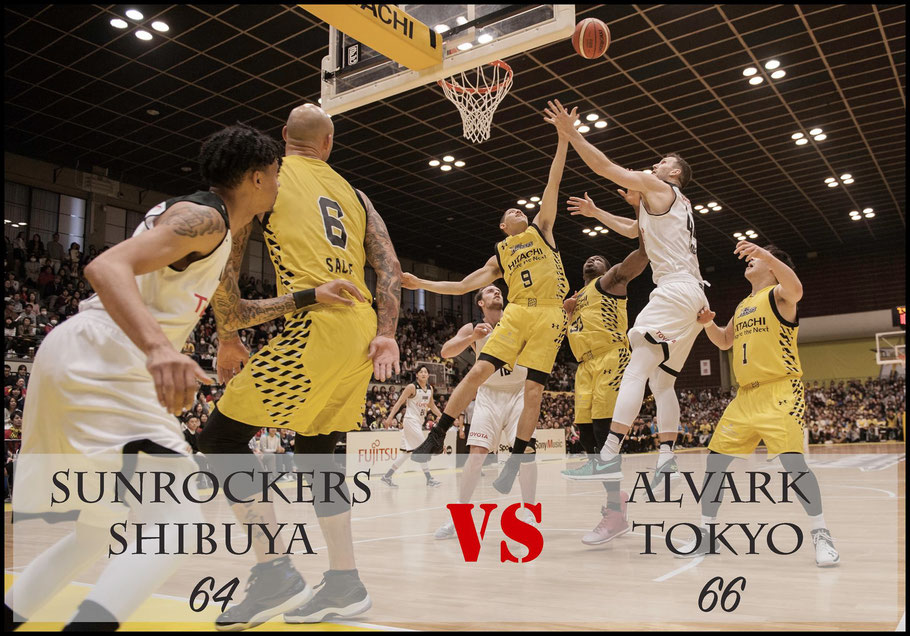
A year ago, the scene would have been at Los Angeles' Staples Center. But there were Robert Sacre and Jeff Ayres, battling before a packed out crowd in Aoyama Gakuin Memorial Hall with the same intensity they played with in the NBA.The high-profile matchup between former NBA big men, who joined their B.League teams in midseason, was the main attraction for the weekend Tokyo derby series between Ayres' Alvark Tokyo and Sacre's Sunrockers Shibuya. While that duel lived up to the hype, in the end it was another ex-NBA player who stepped up and stole the spotlight.
Diante Garrett's fadeaway jumper at the buzzer gave the Alvark a 66-64 victory on Sunday and a sweep of the two-game away series at Aoyama Gakuin University Gym. The win also reduced their magic number for clinching a playoff spot to 2 and kept them one game behind the East Division-leading Tochigi Brex.
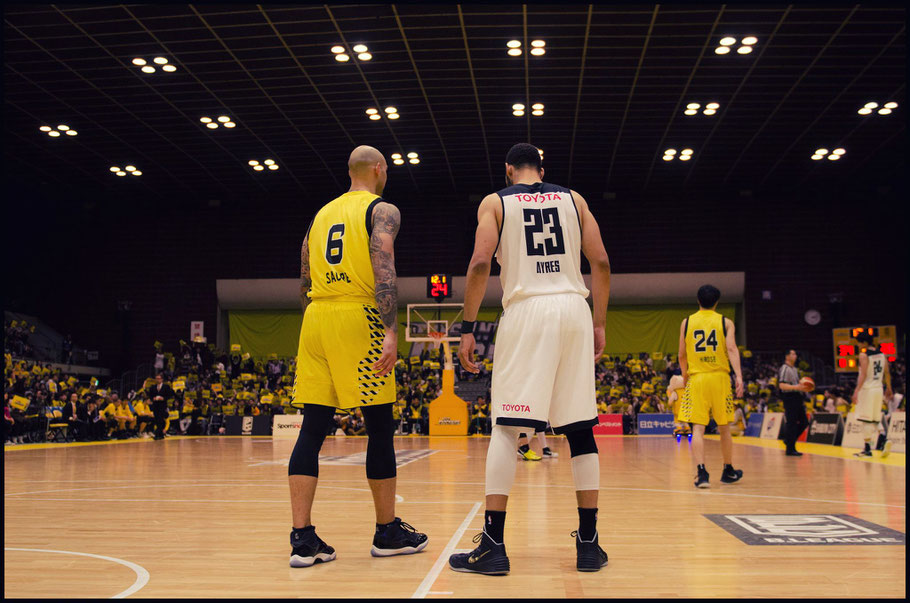
"Everybody as a kid growing up, you've always had that time when you count down in the parking lot or at the park where you're growing up and making the shot," Garrett said of the elation of hitting what he estimates was his fourth game-winning buzzer-beater in organized basketball. "It was one of those days today. It felt good when it left my hand and I knocked the shot down."
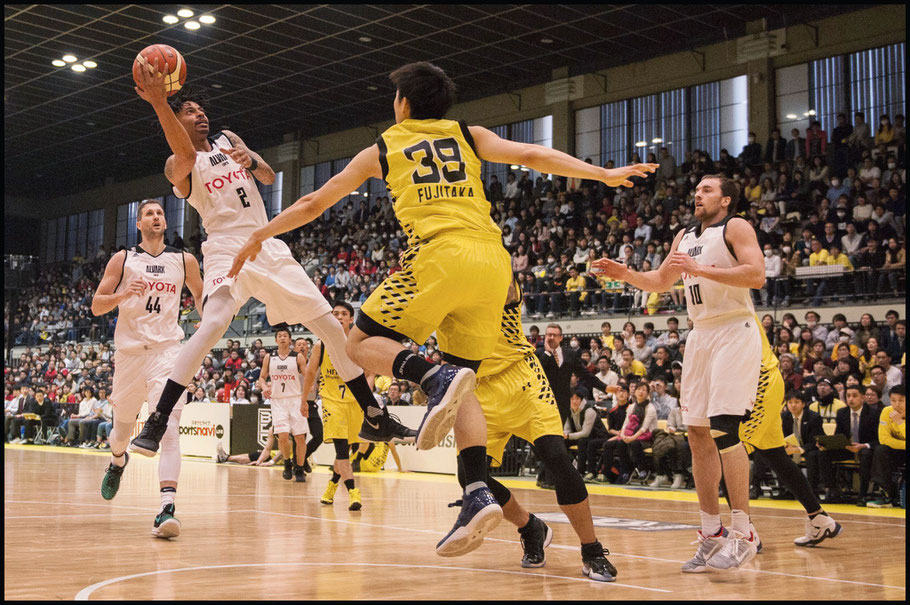
Up to that point, Garrett had been having an off day, in sharp contrast with his effort on Saturday, when the shooting guard netted a game-high 25 points to lead the Alvark to a 95-63 rout. With the final basket Sunday, Garrett finished with just eight points--but "the most important two points of the game," noted Sunrockers head coach BT Toews.
"I didn't play too much in the second or the third quarter, so I had to get my rhythm going in the fourth," said Garrett, who had stints with the Phoenix Suns and Utah Jazz a few years ago. "A lot of guys were making a lot of shots. My shots weren't falling that normally fall. My teammates did a great job in executing all the plays, knocking shots down when we needed them."
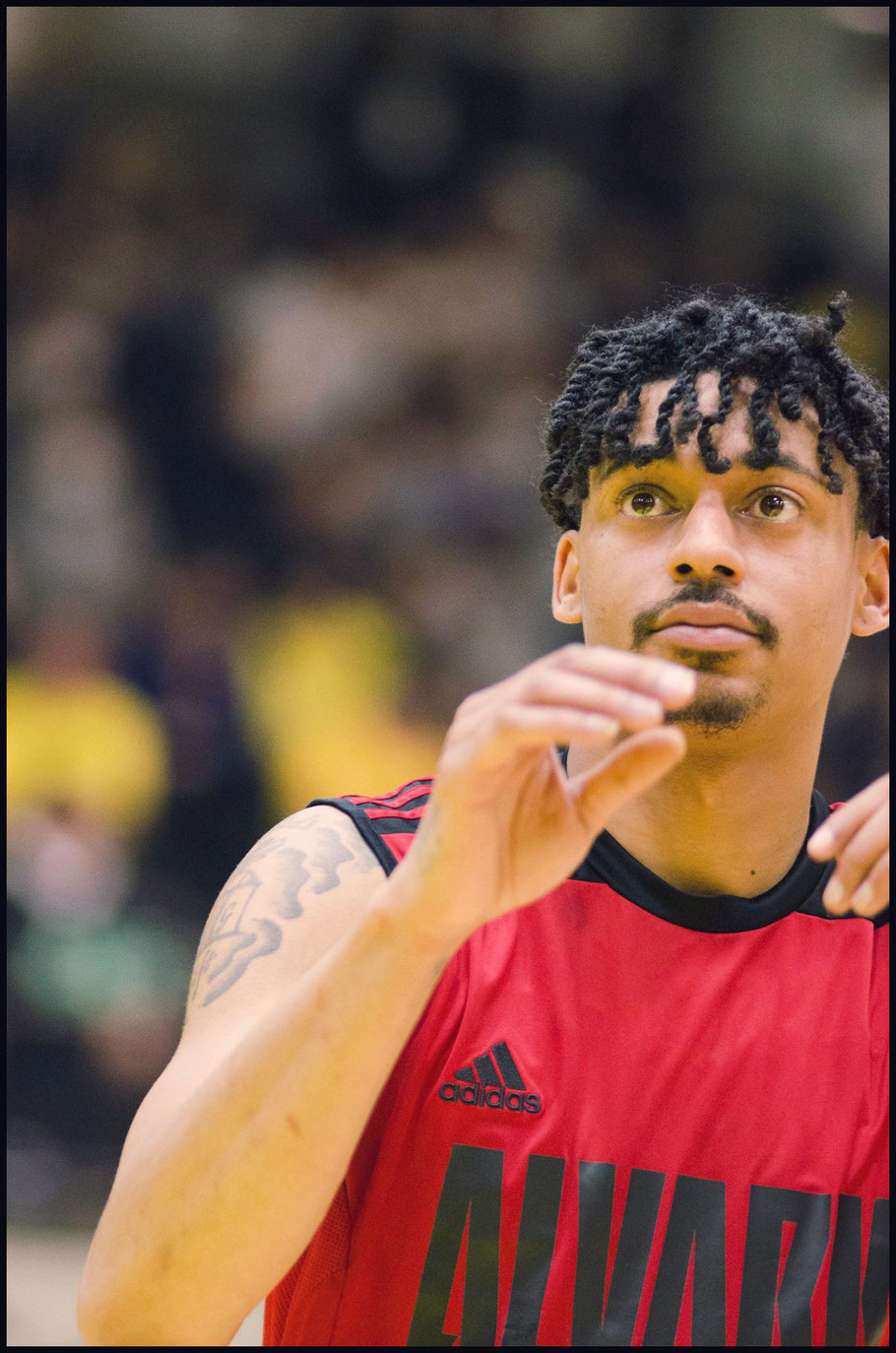
Sacre, who was limited to 12 points on Saturday, came out more aggressively this game and led the Sunrockers with 21, with all of his shots taken inside the arc as he continually went up against Ayres in the paint.
"Absolutely, that was my focus, trying to get myself going," Sacre said. "The last couple of games, I haven't been as aggressive. But I think I was really just focused on doing whatever my team needed me to do today."
Ayres finished with eight points, while Sacre had a slight edge in rebounds 8-6.
"I was just trying to push him out as far as I could," Ayres said. "He's a strong guy, so he's going to get pretty good post position. I just tried to make it as difficult as possible for him. He was hitting some big shots."
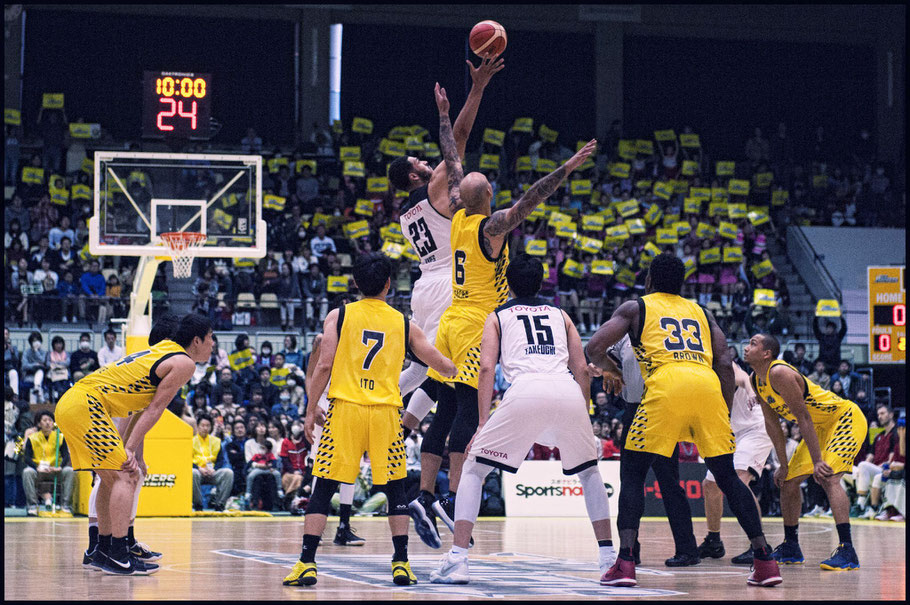
Following Saturday's blowout, Toews said he tweaked his ball-movement-oriented offense to better utilize Sacre in the post, and it nearly paid off.
"After yesterday, I had to think about, do we have any advantage against [Tokyo]?" Toews said. "If you watched the game yesterday, it's like we shouldn't be in the same division. But I thought that if we have an advantage, it's in the post. It's not really the style that we want to play, and actually our offense has been very good up to today in terms of ball movement using Sacre. But today we just had to go in the post. We had to force them to defend."
The 213-centimeter Sacre, who played for the Los Angeles Lakers for the past four seasons, said he enjoyed facing Ayres, whom he recalls facing last year when the 209-centimeter Alvark power forward was a member of the crosstown rival Clippers and praised as "a very talented guy."
"It was good, we were laughing and talking on the court," Sacre said. "It just kind of brought you back to playing in the NBA. I think this league is getting bigger and better and more talented guys are going to start coming over here, just because of what the league can bring. So it's exciting to see that. It was just fun."
Ayres echoed that sentiment, saying, "It was a good challenge. It was a typical battle between NBA big men. I think we played well. He had a great game, and I did what I needed to do to help the team win."
The attraction of Sacre and Ayres going head-to-head was certainly a factor in drawing the standing-room-only crowd of 4,662, as the host team used every available inch of space to pack as many seats as possible into the arena. While it may not compare with a night at the Staples Center, Sacre was impressed.
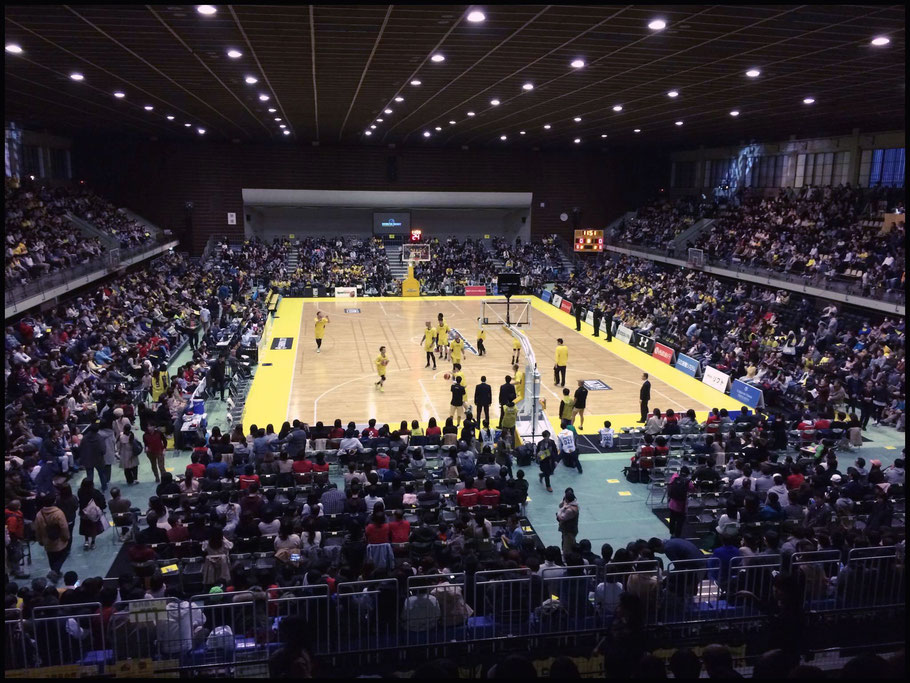
"I was so proud of our fans," he said. "I really hope we can keep bringing that number to our arena. It's awesome to be here, to have that fan support. They come and travel everywhere we go. I think we can just keep building on that and we can compete with Tokyo for having that fan base."
The consecutive losses dropped the Sunrockers to 22-23, leaving them tied for the top spot in the race for second wild card into the playoffs, one of six teams within two games of each other. But squeezing into the postseason is not what Toews envisions.
"Even with the big butt-kicking that happened yesterday, believe it or not, we're not happy to play well and almost win," Toews said. "If that was the case, then the feeling in the locker room would always be, well we just hope to get into the playoffs and get a wild card. We know in order to get to the finals we have to beat a team like this."
That said, Toews added there was a positive side to the result.
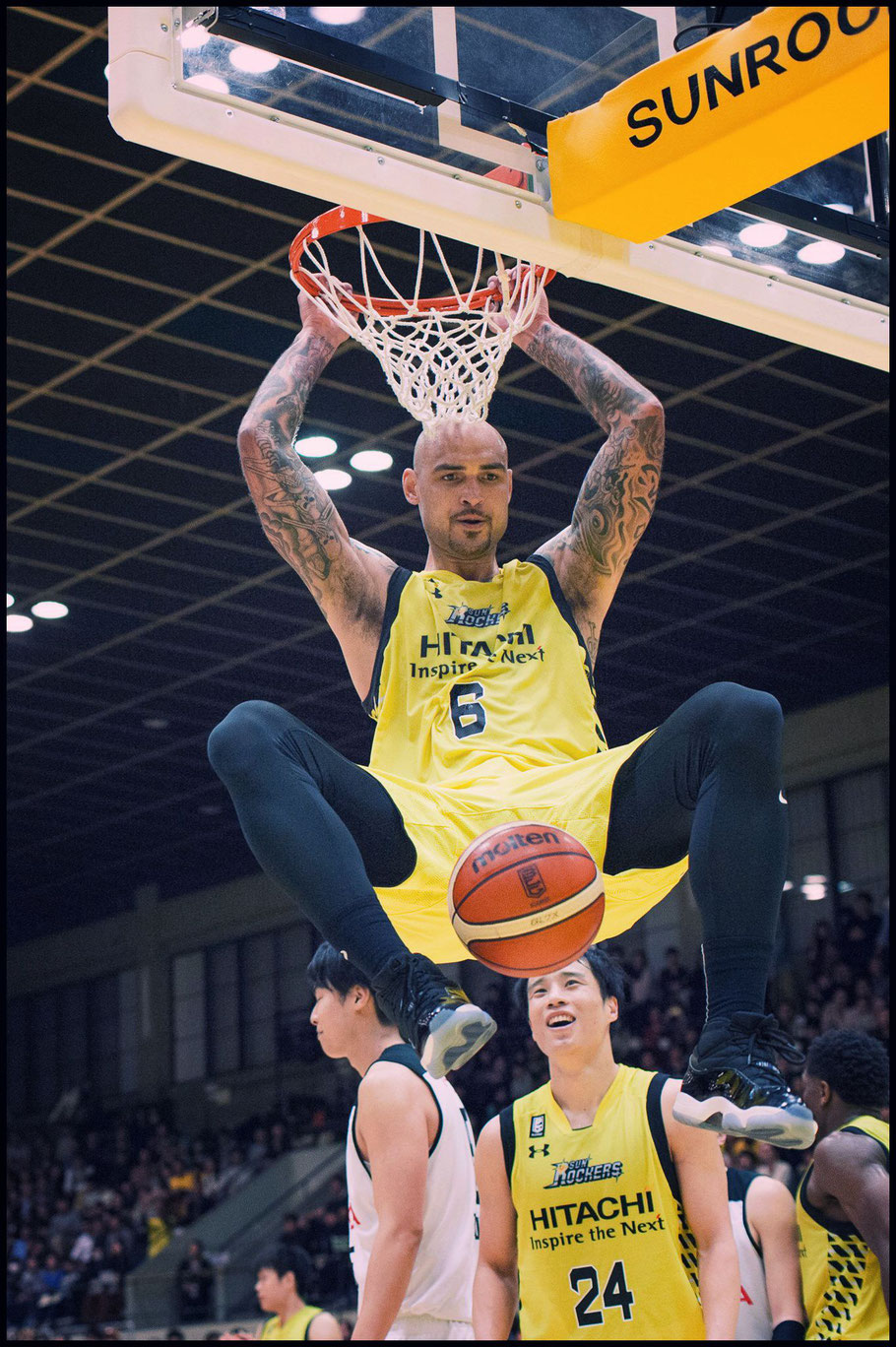
"We at least showed ourselves, and maybe our fans, that we're capable of playing the defense that we're kind of known for this year. Offense is still, depending on the day, good or bad. The defense that we played today is important for our future chances, so that was good."
The Sunrockers led 17-10 after the first quarter, but fell behind midway through the second quarter behind Daiki Tanaka's one-man show, in which he scored all 15 points in a 15-2 run, including three 3-pointers. The hosts bounced back and went on a 12-point run of their own to take a 34-26 lead into halftime.

The Alvark sank four 3-pointers in the third quarter to close the gap, although a Sacre bucket off an offensive rebound with :03 left gave the Sunrockers a 46-45 lead heading into the final period and set up the barn-burning finish.
The lead changed hands several times and neither team could build more than a four-point gap. With the Sunrockers up 62-58 going into the final minute, Tokyo's Joji Takeuchi completed back-to-back 3-point plays, the second set up when he himself tipped a Sunrockers pass to a teammate. With :33 on the clock, Alvark led 64-62.
"Joji coming up big with those plays at the end with those and-ones, that's what we really need, everybody contributing and that's what helped out today," Garrett said.
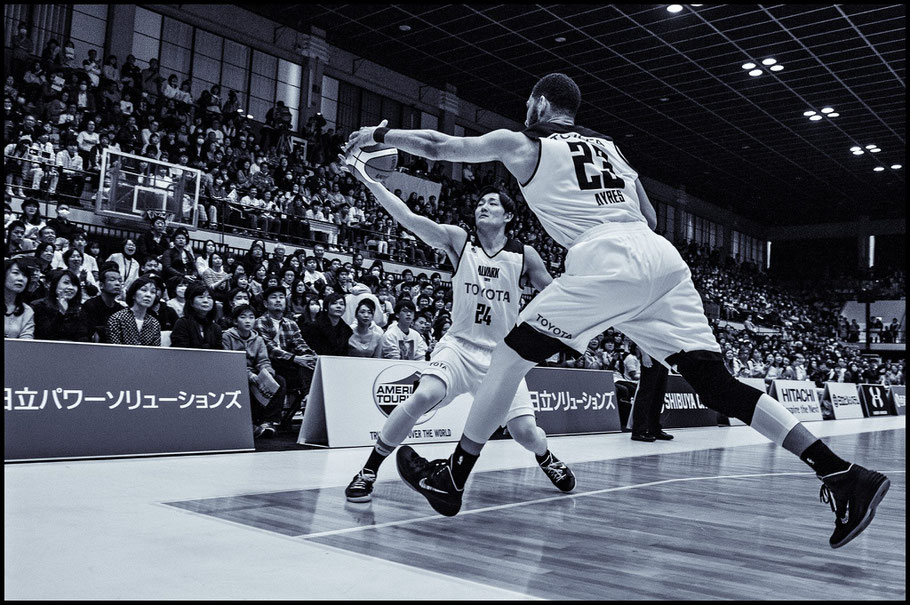
Sacre sent the crowd into a frenzy when he tied the game with a turnaround hook shot in the lane over Ayres with :17 left. Tokyo called a timeout and drew up the play that would put the ball into Garrett's hands.
The strategy set up a screen, and Sacre switched off the pick to defend against Garrett. After a quick cross-dribble, Garrett stepped back and launched a jumper that cleared Sacre's outstretched hand and hit nothing but net.
"I went with a step back to create a little bit more space and I got the shot off," Garrett said. "I said in my head, 'Please don't block it,' but when I saw it on line, I was like, 'That's good' and it went in."
Said Ayres: "The pick-and-roll is designed to cause something, but it was good that they switched at the end. There was more to the play to come, but we saw an advantage and Diante read it and he made the right play."
Amid the wild celebrations among the Alvark players and fans, Garrett went straight to a point along the sideline and pointed, saying later it was a shout-out to his parents, son and fiancée, all of whom were in the stands.
One thing is for sure: the Garrett contingent got what they came to see.
- Ken Marantz: March 20th 2017
First Ones To The Party
Scoring Leader Fazekas Has Kawasaki On Brink Of Clinching Playoff Berth
While it's no surprise to Kawasaki star Nick Fazekas that the Brave Thunders are on the verge of becoming the first team to clinch a playoff spot in the B.League's inaugural season, what has been unexpected was how quickly the team reached that point.
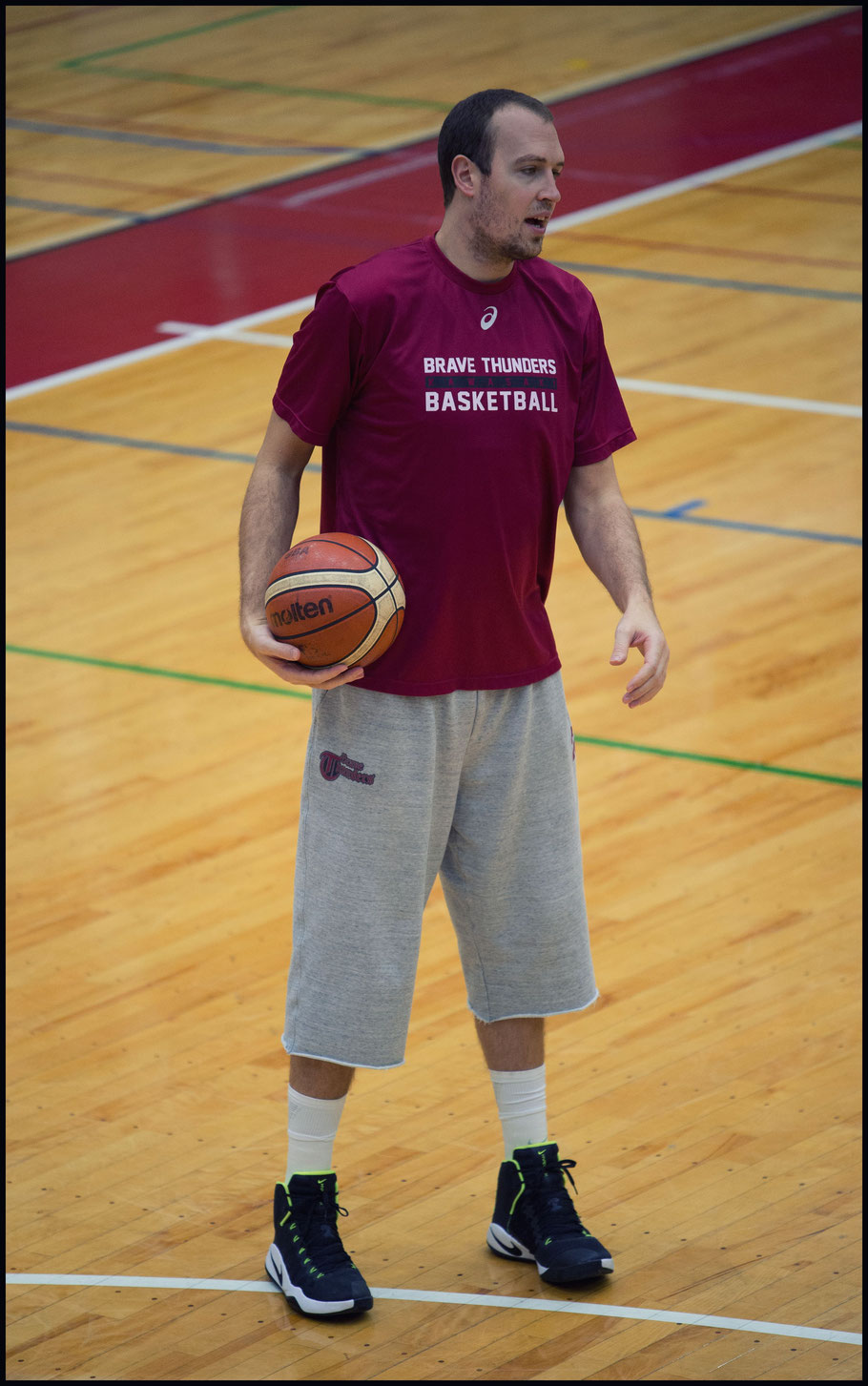
"I don't know if we expected to have only six losses at this point," Fazekas said at practice Thursday ahead of Kawasaki's upcoming two-game showdown with the Seahorses Mikawa in a battle of division leaders. "But we've played really well, and we've been able to go on the road and get some road trip (wins) that were tough."
Kawasaki, which is coming off a championship of the pre-merger National Basketball Association last season, can secure a playoff berth with a win either Friday night or Saturday afternoon over the West Division's Seahorses on its home court of Todoroki Arena, according to the league.

Fazekas, who joined the Brave Thunders in 2012, has been at the forefront of the team's surge to the top of the Central Division with a league-best record of 37-6. The 31-year-old center leads the league in scoring with an average of 27.8 points per game, and is second in rebounding with 12.3 per game. Fazekas, a Dirk Nowitzki-type of center, can score from anywhere on the court.
"I shoot it from the outside. Obviously, I'm shooting really well from 3 this year," said Fazekas, who is 49 for 105 from beyond the arc. "Able to make a lot of free throws this year. But I just pick and choose my spots, try and be as efficient as possible, make sure that every time I shoot it, it's going to go in. I know when the double teams are coming, so that I can get myself out of that situation."
At 210 centimeters and 111 kilograms and a generational heritage of toughness (more on that later), Fazekas can also more than stand his ground in the paint with the bruisers of the league.
"I get a lot of stuff down in the low block," he said. "I'm not like down there banging, I'm not down there backing anyone down. At the same time, I'm not afraid of contact, I don't mind when people are down there being physical. I'll get physical with you."
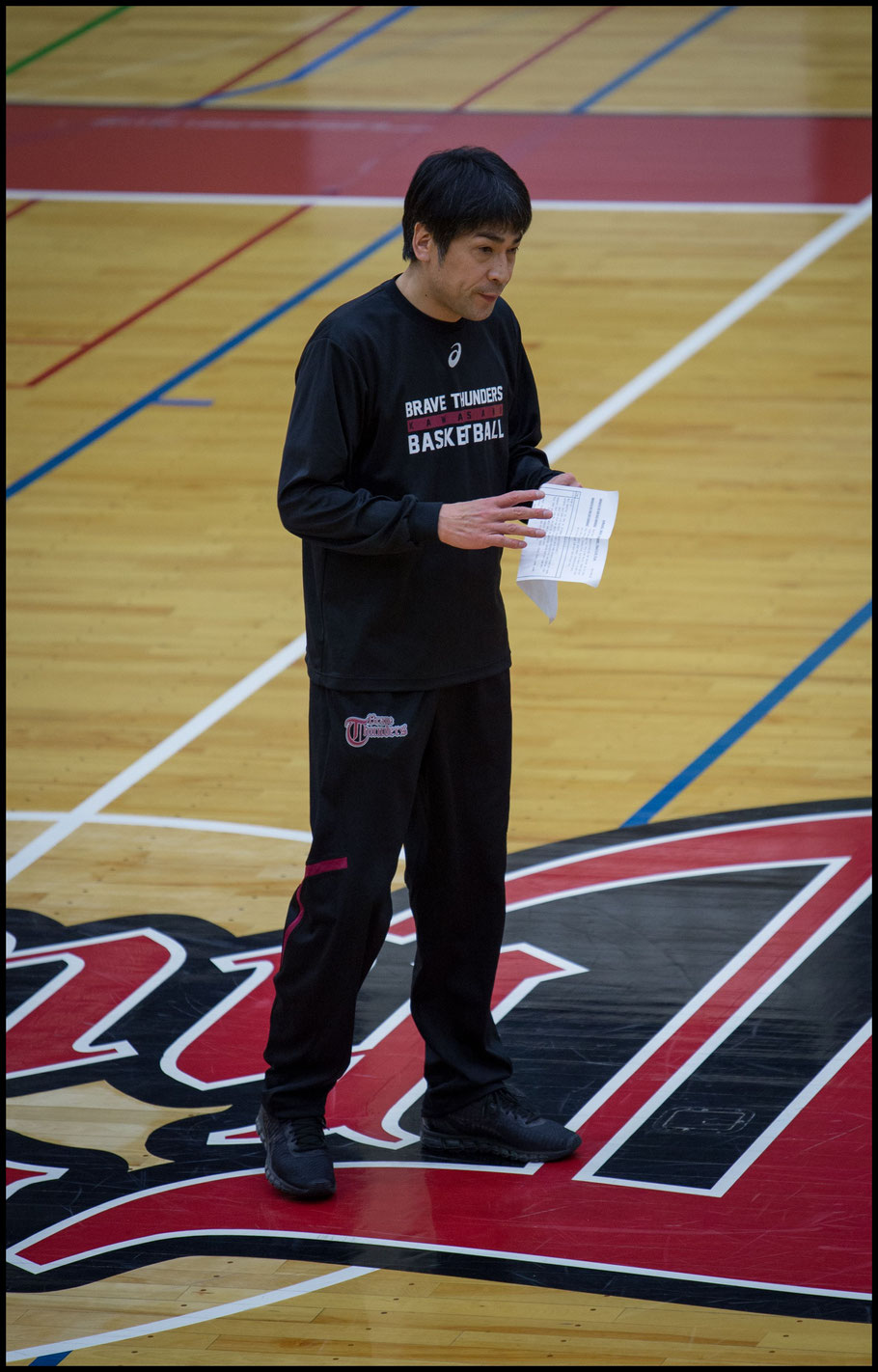
Kawasaki head coach Takuya Kita, a hot-shooting guard on the first-ever Brave Thunders team to win a league title, compares Fazekas to the star of that 2000 team, Steve Bardo, in terms of being the team leader on the court.
"He's a player we can't do without," Kita said. "He's really come along. Of course, he is skillful, and has become a pillar of the team. Different from when he first got here, he has assumed a leadership role. In the beginning, he saw scoring points as his job. When things weren't going well, it would get him down. Now, he spurs on the others and understands his role as the leader. That's something that we were looking for."
Fazekas himself will be looking for a third career title in Japan. In addition to last year, he helped lead the Brave Thunders to the NBL championship in 2014, when he was also named MVP. What sets this season apart is that many more people have been watching it, a result of the added intensity of play and boosted numbers of fans stemming from the merger of the two leagues.
"Even with the discrepancy in records, I still think anyone can beat anyone on any given night," Fazekas said. "The intensity's there, the fans are there. It's just been a lot of fun to put both of the leagues together and see the difference in styles of play and stuff like that."

Kawasaki has been averaging 2,300 fans per game this season, well over two times the number from the NBL days, according to team spokesperson Rie Kuroyanagi. The high came on Dec. 23, when 4,789 witnessed the Brave Thunders’ 93-81 win over the Alvark Tokyo at Todoroki Arena, in which Fazekas scored a season-high 39 points.
"I know for us, they put the attendance up there, and they never used to do that. It's obviously not an NBA number or anything like that, but it's double or triple what we had last year. I can remember specifically in the JBL and the NBL, we would play games in front of a couple hundred people. Whereas now, you're playing in front of at least four-figures of people. That's where a lot of the intensity has come from."
Ironically, had the merger not come through and the NBL teams retained their corporate ties, the Brave Thunders could have looking at perhaps a final season, regardless of their success. The team had previously been a division of Toshiba, now their main sponsor, which is currently in financial straits related to a U.S. subsidiary. In the past, a sports team would have been among the first items on the chopping block to cut expenses. The graveyard of former Japan Basketball League teams is littered with such former top clubs as Isuzu, Matsushita Electric, NKK, Kumagaigumi and others.
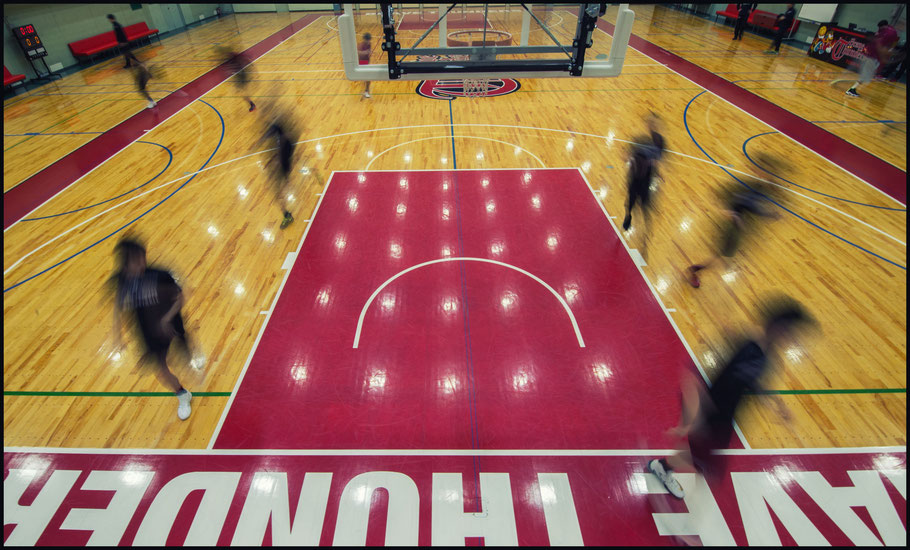
Having become an independent entity as a pro team in the B.League, the Brave Thunder are not directly tied to Toshiba's fortunes, but the electronics giant remains the major sponsor, though that could possibly change. "At this point, nothing has been decided," Kuroyanagi said.
Japan is the latest stop for Fazekas, who led the University of Nevada to four straight NCAA tournament appearances, in a pro career that had previously taken him from stints in the NBA with the Dallas Mavericks and Los Angeles Clippers to Belgium, France and the Philippines.
"Being over here has just been great," he said. "I tell people, the first-best decision in my life was to go to the University of Nevada, and the second-best decision in my life was to come to Japan."
To Fazekas, the appeal of Japan, and Asia in general, is that it puts more emphasis on offense than defensive-oriented Europe. Not surprisingly, Kawasaki tops the league with an average of 85.0 points per game.
"In Europe, it was like every game they wanted (scores) in the 50s and 60s. Prior to (coming to Japan), I was in the Philippines and they play 48-minute games, they want to see 100, 120. Here at Kawasaki, we really preached that we want to score, get out in transition."
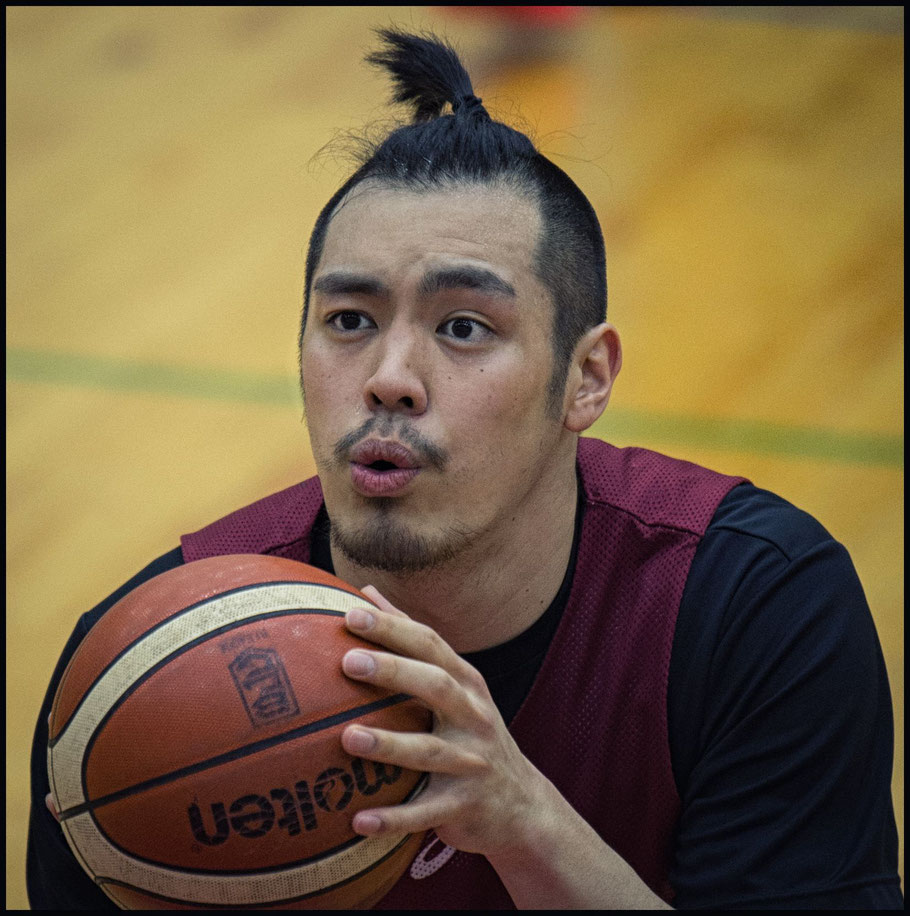
Fazekas said he is not taking away from the importance of defense and its value in leading to victories. But he likes a league in which, when a team scores 80 or 85 points, "you're giving yourself a pretty good chance to win because there's just not very many teams that can get to that many points.
"That's something that I really enjoy, the ability to show that I'm a prolific scorer. I like to score, I like to play offense, and I think that's a huge difference for me from Europe to Asia."
Fazekas, like most Americans, has immigrant ties to Europe, although calling his ancestry dramatic would be a vast understatement. According to a story written by ESPN.com's Tim Keown in 2006 and confirmed by Fazekas, his grandfather Albert was a freedom fighter in Hungary when he was captured during World War II by the Soviets. He was imprisoned in several labor camps (he escaped once but was recaptured).
In what would be his final camp in Moscow, he wrapped his leg in a rag soaked in gasoline to fake an infection. It fooled his captors enough for them to eventually send him home, under the notion that he could not work and was no longer of use to them. After the Soviets crushed the Hungarian revolt in 1956, Albert, his wife and first child were granted asylum in the United States.
"He lived a pretty tough life," Fazekas said. "My dad's tough as nails, too. Two times the size of me, he's a big dude. So there's no soft skin when it comes to the Fazekases, and I guess it started with my grandpa."
- Ken Marantz: March 17th 2017
Never One To Put On Ayres
Intense But Modest, Newly Acquired Ex-NBA Player Embraced By Alvark As Team Leader
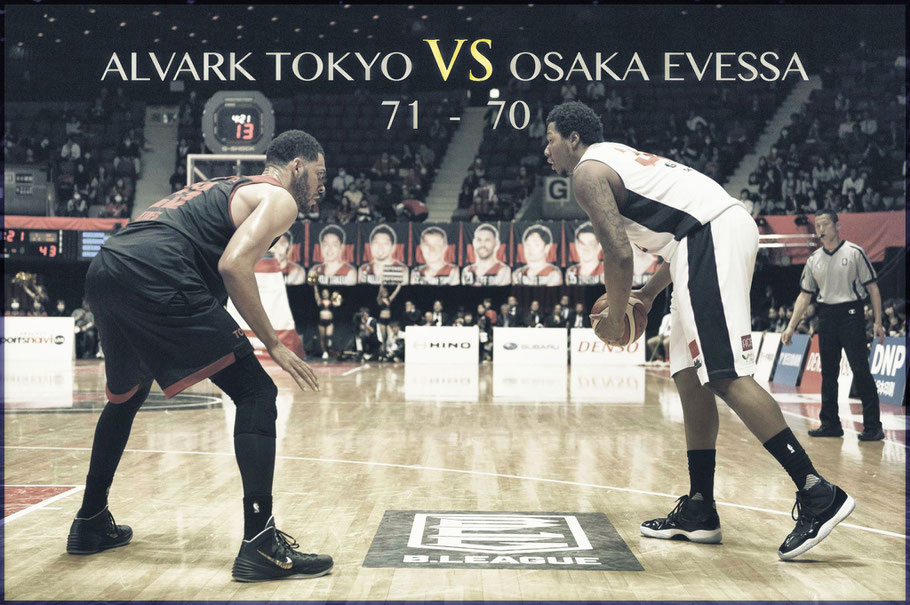
After passing to a teammate slicing down the side of the lane, Jeff Ayres cut over to the opposite corner, where he received a return pass along the baseline. Except that the pass was off line and took the American out of bounds for a turnover.
What Ayres did next showed why, after less than a month since joining the Tokyo Alvark, he has earned his teammates respect as the team leader. He did not roll his eyes at the bad pass, nor clap his hands in frustration. He pointed to the teammate and nodded in praise for trying to make a play by being creative.
"That's just how I play," Ayres said after leading Tokyo to a 71-70 victory over the Osaka Evessa on Friday night at Tokyo's Yoyogi No. 2 Gym. "As long as we're making the right plays, trying to hit open guys while we're being aggressive at the same time. There's nothing wrong with that, and I want to encourage the guys to keep that up and keep doing it.
"It was a funny pass and I couldn't quite get it, but the idea was the right idea. You want to keep encouraging it so they don't get down on themselves. I'm not mad at anything as long as we keep making the right plays."
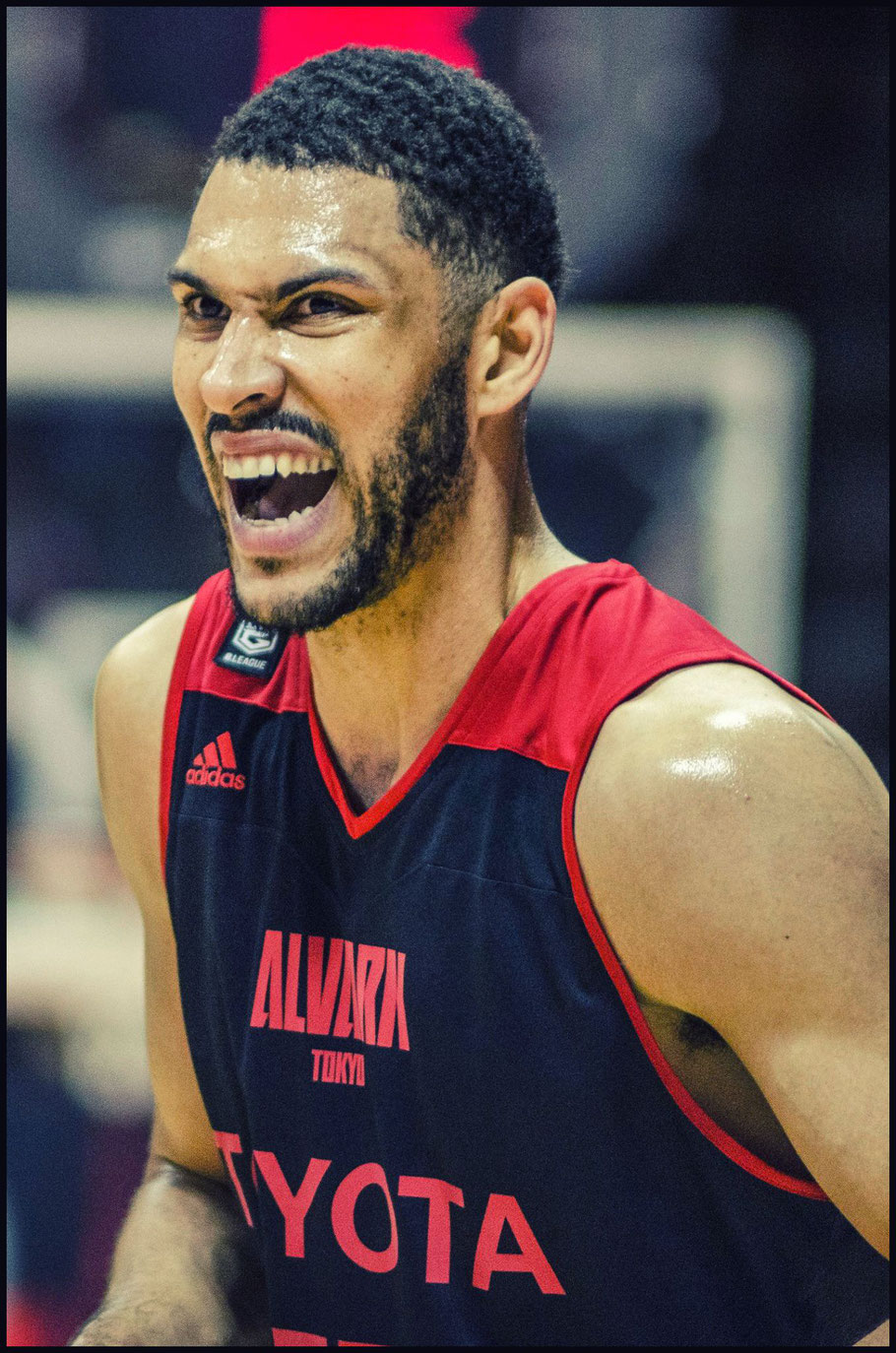
Thanks to Ayres, the Alvark fans have had plenty to smile about. One of a handful of former NBA players who have joined B.League teams in midseason, Ayres has helped Tokyo remain in a tight East Division race with the Brex Tochigi. Ayres knows something about winning titles--he was a member of the San Antonio Spurs team that captured the 2014 NBA championship.
But the NBA pedigree that the 29-year-old Arizona State product brought to Japan has not jaded his outlook on playing here. His dedication at both ends of the court has been a pleasant surprise for Alvark head coach Takuma Ito and his teammates.
"Among the American players, there are many who don't play defense," Ito said. "He himself has wondered why that is. To him, defense, rebounding and offense are things he gives 100 percent to. It's the same in practice. That attitude has a good influence on our team."
Over six games, Ayres has averaged 14.5 points and 7.8 rebounds. But when the team needed him to step up, as it did on Friday night, he came through with a game-high 24 points--his highest output so far--while blocking three shots.
In the second game of the two-game set against the Evessa on Saturday afternoon, Ayres was limited to nine points, but the Alvark rolled to a 75-58 victory, despite squandering a big first-half lead before pulling away in the fourth quarter. That gives Tokyo, now 33-10, a magic number of 5 to clinch a playoff spot with 17 games remaining in the regular season.

Although Tokyo was missing shooting guard Diante Garrett, who is sixth in the league in scoring with a 17.8 ppg average, due to a wrist injury, Ayres did not see his role being any different.
"It's the same, to be a leader on the floor, to be vocal as possible, to get points when we need to," he said. "Just be a presence on both sides of the floor--on the court and on the sideline."
The 209-centimeter, 113-kilogram Ayres found himself having to match-up most of the game with Osaka's burly big men Xavier Gibson (210 cm, 120 kg) and Josh Harrellson (208 cm, 125 kg), another player with NBA experience. Still, he made his presence felt, whether it was feeding a teammate for a layup, popping in 3-pointers or slamming home a dunk.
"I knew going into the game it was going to be a big match-up and a battle," Ayres said. "After playing guys like (Tochigi's Ryan) Rossiter and (Jeff) Gibbs the week before, it's a total 180. Harrellson can shoot the ball, but Xavier, when he's on the block, he's a big monster. I knew it was going to be a 40-minute heavyweight fight. So just kind of stick with it, and hopefully he wears out before I did."
On Friday, Gibson led Osaka with 16 points while Richard Roby had 13 and Harrellson 10. Harrellson had his biggest affect on the game in an unanticipated way, a result of frustration for what he considered, shall we say, a lack of quality refereeing.
With Osaka leading 62-61 with less than three minutes left, Tokyo's Shohei Kikuchi made an amazing play to keep a rebound from going out of bounds, then took the ball the length of the court for a layup that drew a foul by Harrellson. The American's fiery pleas that Kikuchi had pushed off and should have earned the foul only resulted in a technical foul.
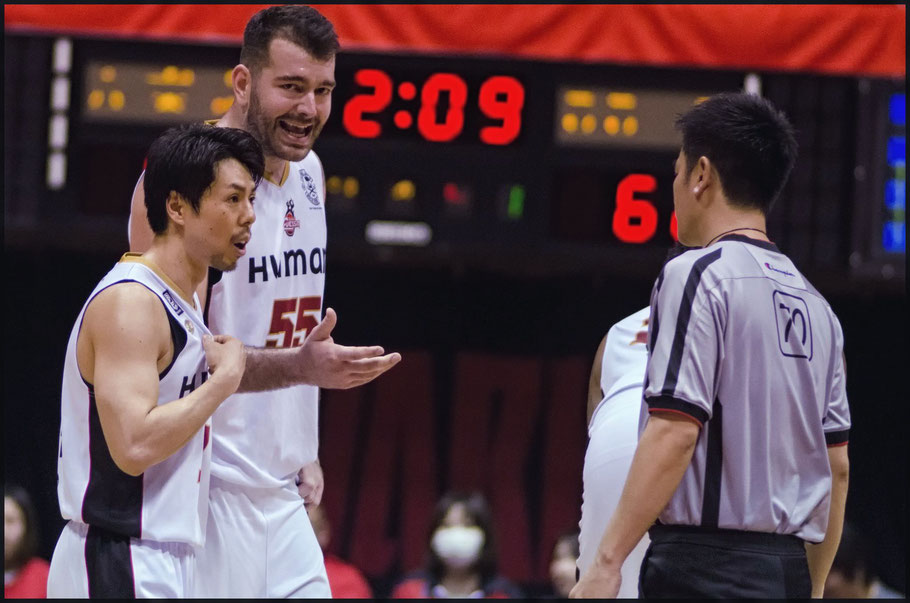
Kikuchi made the free throw to complete the 3-point play, then Ayres sank the shot from the line for the technical to put Tokyo up 67-62 with 1:50 remaining.
"End of the game, crunch time, that was a big momentum shift for us, and it gave us extra juice to keep going," Ayres said. "Obviously it affects them as well, so for us, it was huge."
Gibson agreed, saying, "I think the technical really took the air out us. It really slowed us down and made us kind of look at it like, whoa, it's going to be hard to win this one."
While it put the Evessa in a hole, they nearly dug themselves out of it. A 3-pointer by Harrellson with :38 left cut the Alvark's lead to 69-67. On the ensuing play, Tokyo lost the ball out of bounds. Originally, it was ruled Tokyo's ball, but the call was reversed by replay review, giving Osaka possession with :13.9 remaining.
But Hiryuki Kinoshita's 3-point attempt fell short and Tokyo grabbed the rebound with two ticks of the clock left. The Alvark's Kikuchi was fouled and sank a pair of free throws, before Gibson hit a 3-pointer at the buzzer for the final margin of victory.
"It was a good one, a barnburner," Gibson said.
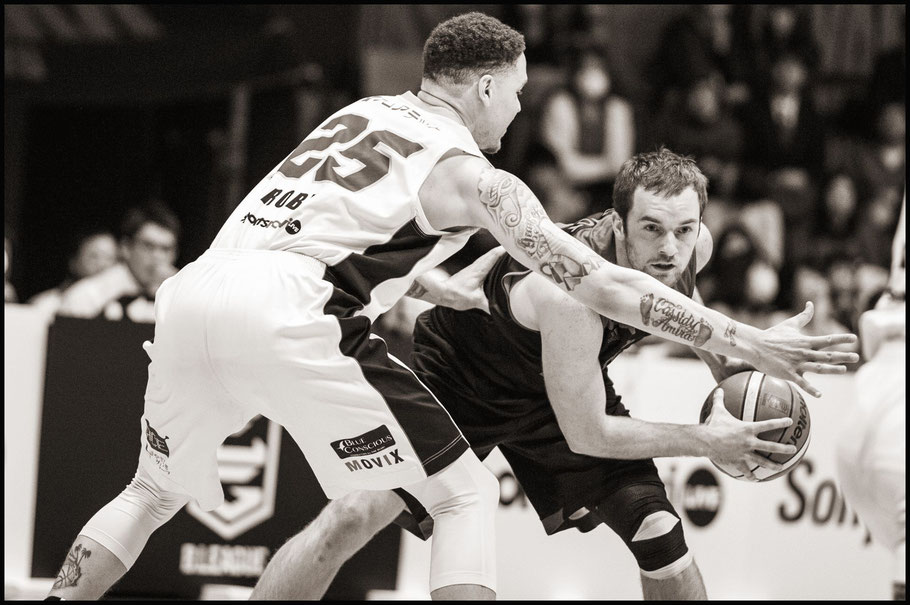
Like the Alvark, the Evessa are locked in an intense battle to make the playoffs. Now 21-22, every win could mean the difference between three very diverse scenarios - finishing second in the West Division, earning a wild-card spot, or finishing out of the playoffs completely.
"We can finish second, so every game is very important to us," Gibson said. "Not only for winning, but in order to get a good rhythm going into the playoffs. That's our main goal, to kind of get a rhythm and figure each other out, and make sure we're playing at our best."
Now in his fourth season in Japan and first with Osaka--he played one year with the Alvark - Gibson always keeps his cool in the heat of battle, but understands the frustrations that can build up in a player like Harrellson.
"I'm kind of used to it. It's my fourth year playing here, and I know Josh is pretty new, he's coming from the NBA, also. It's kind of my job to keep him cool. It happens, sometimes calls don't go your way, but you just have to stay positive."
Tokyo had to make a quick turnaround playing on a Friday after a rare Sunday-Monday set against the rival Brex, in which they split the two games. Coach Ito said the limited practice time might have accounted for the team's slow start, when they were outscored 23-12 in the first quarter.
As with everything, Ayres took the situation in stride and tried to make the best of it.
"There's no use in complaining about it or putting too much thought into it," he said. "It is what it is. So we tried to practice and get as much work in as we could. I think everybody responded well in the second quarter and second half, after that sluggish first quarter."
Although he is still limited to just a few basic Japanese words, Ayres said that communication has not been a problem.
"I feel for the most part everybody understands, especially enough in the game, the main points that we want to get across," he said. "It works. We're not trying to have a full conversation in the heat of a game."
Next up for the Alvark is a Tokyo derby March 18-19 with the Sunrockers Shibuya as the away team at Aoyama Gakuin University Gym, while Osaka returns home to face the Yokohama B-Corsairs at Sumiyoshi Sports Center.
- Ken Marantz: March 10th 2017
